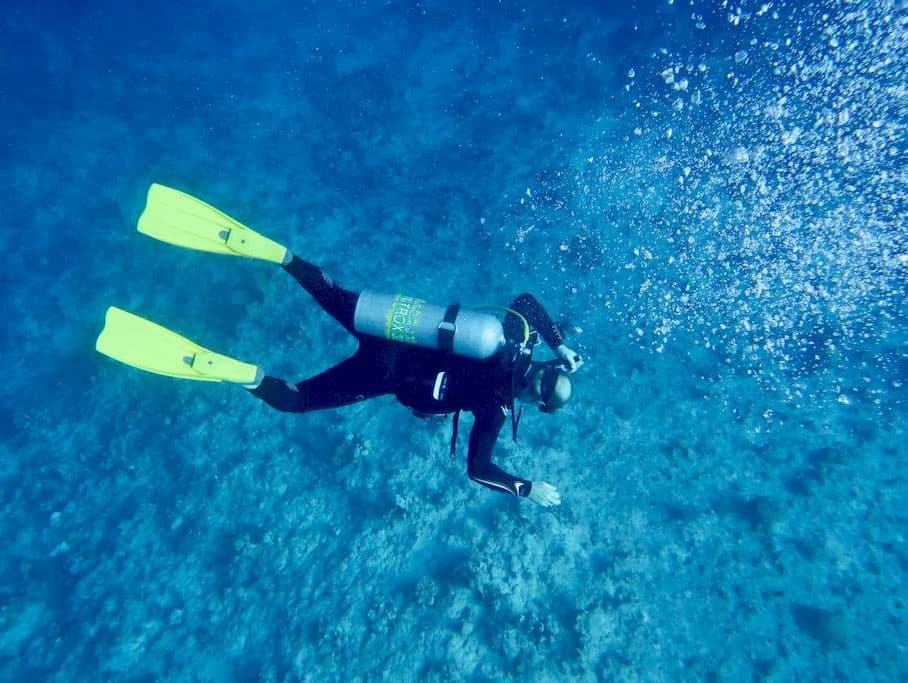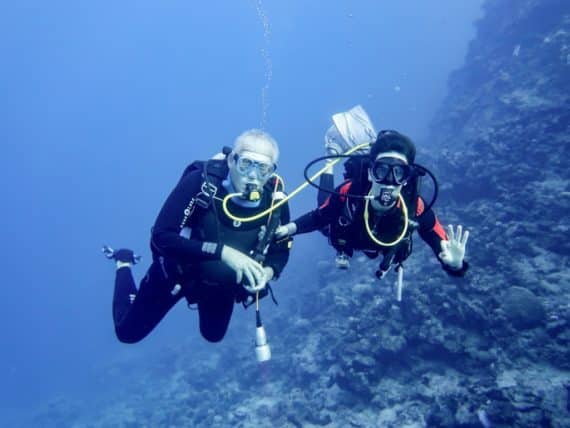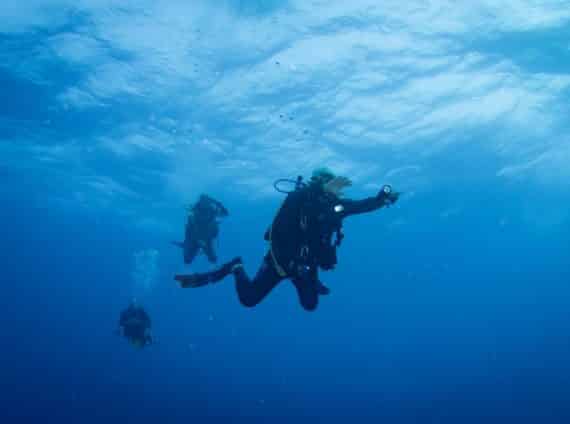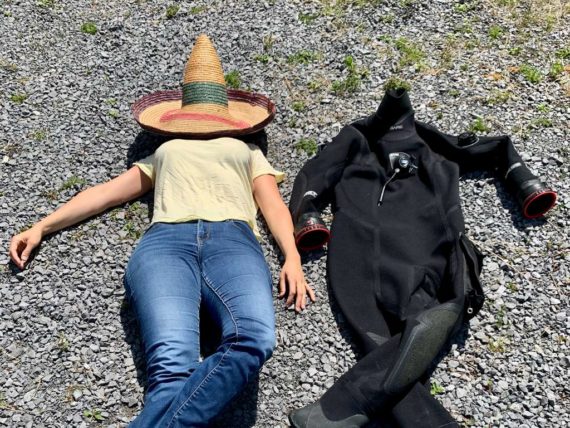Diving and anxiety: 7 ways to better understand it

Diving anxiety, a complicated association
The diving anxiety, we talk about it,… or not, precisely.
This Friday, when I arrive at the quarry, I still don’t know that I will experience the anguish of diving… and yet.
The surface conditions are good: I am cool, the weather is fine, the dive is “easy”,… And I dive in an environment that I know very well with my usual buddy.
We have planned a deep dive at -50m in dark and cold waters. For the occasion, our diving tanks are filled with a mixture of TRIMIX to cancel out the narcotic effects.
We know this dive very well and have already done it many times. I am guiding my buddy because, here, I could almost go down “with my eyes closed” to the wreck of a small sailboat.
Diving conditions
Not surprisingly, underwater, the conditions are bad.
From the depth of -30 m we move in a water completely black with a visibility not exceeding 50 cm.
Of course we know the place very well. However, this time we almost have to feel forward because the visibility is so poor.
Arrived on a plateau at -46m, I sweep around me with my powerful diving lamp to look for my landmark. From there we have to dive to the -50m. The light is almost totally absorbed by the darkness of the backgrounds that surrounds us, that envelops us.
I know that the wreck is there very close to us and yet I don’t see it. In front of me, there are just black and white suspensions that gets us into an almost hypnotic starry atmosphere.
When anxiety occurs while diving….
While I know this environment so well, I have a feeling of anguish winning me over, insidiously.
Very quickly, my mind then lights up a powerful signal saying:
“Be careful, a panic at 50m with these conditions = danger”.
I take two calm and deep breaths and turn to my buddy. I would like to tell him that things are not going well and that I want to start the ascent. We turn directly towards the drop off and start without delay but without any rush to go up.
I’m not usually afraid of the dark when diving. Yet, on that day, I was hypnotized by this lack of light. The beam of my lamp being reduced and almost totally absorbed by the environment, as is often the case there.
So I grab my buddy’s hand when we are almost shoulder to shoulder… But I absolutely don’t want us to get lost at this very moment.
The feeling of anguish is always present, latent in my mind and sends its ugly vibrations throughout my body. It’s just that it seems to like me a lot that day, I don’t.
Soon we reach the clear zone at -30m.
In a few gestures, I then explain to my buddy that I was not comfortable below.
He smiles and signals to me that everything is okay and we finish the dive quietly.
As we had 15 minutes of mandatory deco-stops, we had to stay underwater a bit more.
In the end, we will have a great dive.
Anxiety when diving, can it really happen?
While recalling this recent anguish in diving, I think of a question that is regularly asked to me in private by Internet users:
“Do I ever feel the anguish of diving?
As far as I am concerned, the answer is: “Yes, it has happened to me several times before, and yes, it has happened to many divers”.
But unfortunately, few people talk about it.
However, it seems to me that there is still a kind of shame about being “weak” or afraid to be judged if you express your anguish. While talking about it is so much easier to live with and it also helps others to speak… and to express themselves about their own experiences of fear.
Consequences of diving anxiety
Of course, a feeling of anxiety while diving is very unpleasant and potentially dangerous. Do you remember what I explained to you about the effects of diving stress?
It is essential in the case of diving anxiety to inform your buddy quickly. Because if you don’t do it, you can put yourself in danger and your buddy in danger too (if at some point you can’t manage it anymore, he too can react badly, not understanding what’s going wrong).
It is very important to communicate what you feel to your buddy. It is a fundamental safety rule. This is also part of accident prevention.
It doesn’t matter to have a moment of anguish while diving. But you have to dive without endangering yourself or others.
A second question directly related to the first can then arise:
Can diving anxiety come back during other dives in the future?
In my opinion, the answer is “maybe, maybe not”.
The difference is that, when you have experienced an anguish while diving, “you know” and this can make things more manageable.
Therefore, experiencing the anguish underwater may allow us to understand its origin and to approach it more serenely if it comes back.
7 ways to think about the causes of diving anxiety
Understanding why we experienced an anguish while diving often helps to demystify it and above all to prevent future anguish.
Here are 7 points to consider:
Dive site: Was the dive site usual? Was the dive center or manager trustworthy (in our mind or in reality)
Planning: Was the dive well prepared? Is the briefing complete enough to understand the dive process? Was the buddy known? Narcosis: Was the depth reached greater than -30m? Was the gas used adequate?
Material: Is the regulator (and the rest of the equipment) well maintained? Was the tank completely open? Wasn’t the suit too tight? (Or the chest strap of the BCD). Was the weight appropriate?
Diving conditions: Was the dive rushed? Was visibility worse than usual? Were there any annoyance before the dive?
Spirit: Were there any particular professional, family or other concerns? Were we rested well enough? Had we stayed up late the night before? Had a painful event occurred in our surroundings? Have we had the mind invaded by negative thoughts?
Body: Were we coming out of a disease for which we had taken medication? Was it during menstruation? (My experience shows me that I am much more sensitive underwater at that time, especially in terms of emotions). Should we have kicked more than usual during this dive, for example because of the current? Were we cold or hungry or thirsty?
This list is not exhaustive. If none of these leads to an understanding of diving anxiety, it is also possible to admit that there may also be non visible rational explanation. You can also check here
What to do if the anxiety returns?
- Notify your buddy
- Gently start the ascent until the feeling of anguish disappears (this does not mean that you must stop the dive but at least go up a few meters, often this is enough). If necessary, go up to the surface and finish the dive, tomorrow is another day.
- Kick as little as possible to avoid running out of breath
- Breathe as calmly as possible, insisting on exhaling.
- Focus your mind on something else. If you like to take a camera with you, it’s magic against anxiety because the mind focuses on the picture. Or observe the environment with your diving lamp to fix your attention and mind.
Are there techniques to manage diving anxiety?
In my opinion, the answer is yes.
Hypnosis, meditation, mindfulness, yoga,… all techniques aimed at relaxing the body and mind are interesting to experiment in order to dive with maximum serenity.
Everyone must find the method that best suits them.
Tip:
Recently I came across an “extreme” diver. A young guy doing very deep dives on spots that are not always easily accessible. He told me that he had set himself a rule from which he never deviated and that I want to share with you:
“If I go diving and two annoyances of any kind happen to me before the dive, I give up. No matter how beautiful the planned dive is.
And what are your tips to avoid and/or manage diving anxiety?
And above all,… don’t forget to be happy 🤗
Hélène









